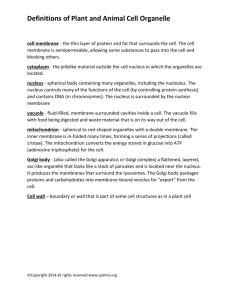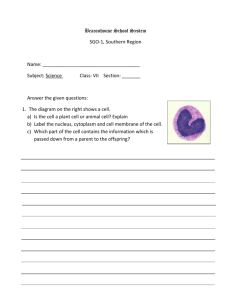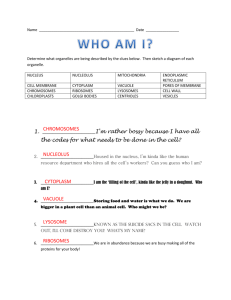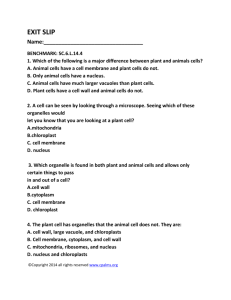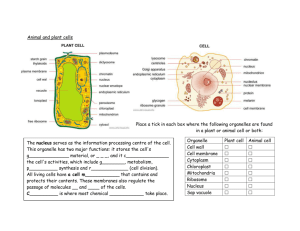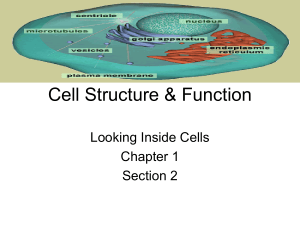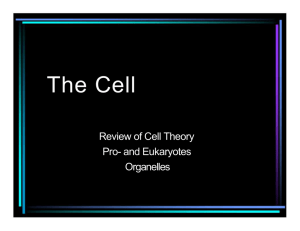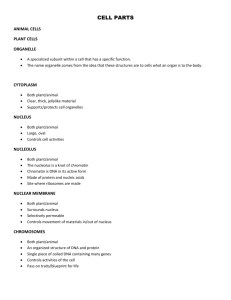Cells Vocabulary List & Definitions Week of 12/7/2015
advertisement
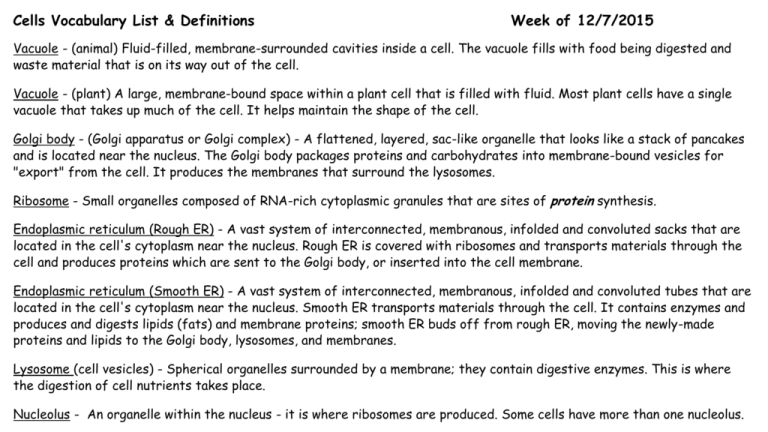
Cells Vocabulary List & Definitions Week of 12/7/2015 Vacuole - (animal) Fluid-filled, membrane-surrounded cavities inside a cell. The vacuole fills with food being digested and waste material that is on its way out of the cell. Vacuole - (plant) A large, membrane-bound space within a plant cell that is filled with fluid. Most plant cells have a single vacuole that takes up much of the cell. It helps maintain the shape of the cell. Golgi body - (Golgi apparatus or Golgi complex) - A flattened, layered, sac-like organelle that looks like a stack of pancakes and is located near the nucleus. The Golgi body packages proteins and carbohydrates into membrane-bound vesicles for "export" from the cell. It produces the membranes that surround the lysosomes. Ribosome - Small organelles composed of RNA-rich cytoplasmic granules that are sites of protein synthesis. Endoplasmic reticulum (Rough ER) - A vast system of interconnected, membranous, infolded and convoluted sacks that are located in the cell's cytoplasm near the nucleus. Rough ER is covered with ribosomes and transports materials through the cell and produces proteins which are sent to the Golgi body, or inserted into the cell membrane. Endoplasmic reticulum (Smooth ER) - A vast system of interconnected, membranous, infolded and convoluted tubes that are located in the cell's cytoplasm near the nucleus. Smooth ER transports materials through the cell. It contains enzymes and produces and digests lipids (fats) and membrane proteins; smooth ER buds off from rough ER, moving the newly-made proteins and lipids to the Golgi body, lysosomes, and membranes. Lysosome (cell vesicles) - Spherical organelles surrounded by a membrane; they contain digestive enzymes. This is where the digestion of cell nutrients takes place. Nucleolus - An organelle within the nucleus - it is where ribosomes are produced. Some cells have more than one nucleolus. Cells Vocabulary List & Definitions 2015 REVIEW FROM LAST WEEK: (These will still be on this week’s quiz.) Organelle - A specialized subunit within a cell that has a specific function, and is usually separately enclosed within its own membrane. Cell membrane - (plasma membrane) - The thin layer of protein and fat that surrounds the cell. The cell membrane is semipermeable, allowing some substances to pass into the cell and blocking others. Cytoplasm - The jellylike material outside the cell nucleus in which the organelles are located. Mitochondrion - (Mitochondria) - Spherical to rod-shaped organelles with a double membrane. The inner membrane is folded many times, forming a series of projections (called cristae). The mitochondrion converts the energy stored in glucose into ATP (adenosine triphosphate) for the cell. Nucleus - Spherical body containing many organelles, including the nucleolus. The nucleus controls many of the functions of the cell (by controlling protein synthesis) and contains DNA (in chromosomes). The nucleus is surrounded by the nuclear membrane. Cell wall - (plant) a thick, rigid membrane that surrounds a plant cell. This layer of cellulose fiber gives the cell most of its support and structure. The cell wall also bonds with other cell walls to form the structure of the plant. Chloroplast (plant) An elongated or disc-shaped organelle containing chlorophyll. Photosynthesis (in which energy from sunlight is converted into chemical energy - food) takes place in the chloroplasts.
